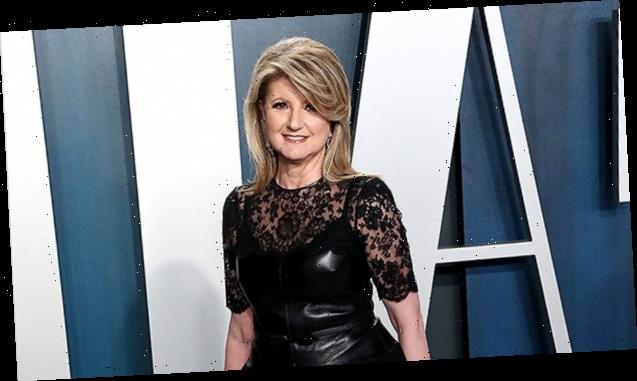Ahead of her appearance at the No7 Unstoppable Together Job Summit, the Thrive Global founder discusses the impact of the COVID-related recession on women’s mental health.
It has been dubbed the “she-cession” because of the disproportionate way the COVID-related economic downturn has affected working women. The figures speak for themselves. Four times more women than men dropped out of the U.S. labor force in September 2020, according to the Bureau of Labor Statistics.
Meanwhile 2.5 million women have “lost their jobs” or left the workforce since the pandemic began, according to a Feb. 12 Washington Post op-ed penned by Vice President Kamala Harris, who calls the “mass exodus” a “national emergency.” Even those women blessed to still have jobs are forced to juggle parenting and teaching with the demands of working remotely. If burnout was a problem for working moms before COVID-19 gripped the nation, many believe it has reached worrying levels now.

Arianna Huffington is among them. The importance of mental health is something that the Thrive Global founder and CEO is going to address at the No7 Unstoppable Together Job Summit on Feb. 24. “Mental resilience,” she says, “Has to be a key part of our new normal.” In this Q&A, she tells HollywoodLife why sleep and taking “microsteps” play a big part in doing just that:
HL: Tell us about the No7 Unstoppable Together Job Summit? Why is it crucial to address the she-cession now?
Arianna: “Women have borne the lion’s share of the economic burdens of the pandemic, which we can see in job losses, women leaving the workforce, and in the disproportionate mental load of running family life at home. Too many women are being forced to choose between being successful in their jobs or being successful in their roles at home. And this she-cession threatens to roll back many of the gains women have made in recent years.
“By giving women the tools, they need to protect their own mental resilience and well-being, we can empower them to navigate the uncertainties that will define our future. For all the challenges of this time, this is also a once-in-a-generation opportunity to create a new normal for women that’s a better normal.
“Mental health impacts us all and there are steps women can take in their own lives to be proactive with their health, which is why I’ll be speaking at the No7 Unstoppable Together Job Summit on Feb. 24 with The Female Quotient CEO Shelley Zalis about this very topic of the she-cession and its impact on mental health.”

HL: What can the government do to help women get back to work?
Arianna: “The stimulus plan being debated by Congress and the White House right now contains some promising proposals that could help struggling women, like extending unemployment insurance and paid leave. The plan also includes money to help reopen schools and bail-out child care providers. The Marshall Plan for Moms shows that the conversation is changing. What’s encouraging is that the conversation is changing to account for the scale of the problem. But while we wait for urgently needed changes and agenda-setting that only the government can exert, we also need to do what we can at the individual and company levels as well.”
HL: You’re a big believer in the value of sleep. Many people who have lost their jobs, or are facing economic and health challenges, may be struggling to sleep right now. What is your top tip to soothe their mind to help them to get to sleep during stressful situations?
Arianna: “Sleep is always essential to every aspect of our physical and mental well-being. But in times of crisis, getting the sleep we need is more important than ever. Sleep is vital to our immunity as well as to helping us manage stress and anxiety. My favorite tip is to charge your phone outside of your bedroom at night. Our phones are repositories of our anxieties and fears, especially in times of crisis. So, disconnecting from our phones at night helps us disconnect from a stressful day and get the sleep we need to be recharged and better able to take on the challenges of the next day.”
HL: Please explain your concept of microsteps and why you think they’re essential to improving well-being and avoiding burnout.
Arianna: “Microsteps are the heart of our behavior change system. They’re small, science-backed steps we can start immediately incorporating into our daily lives. We are, as the saying goes, creatures of habit. According to a study from Duke University, around 45 percent of our everyday actions are made up of habits. But as most of us have learned, unlearning bad habits and learning new ones are not so easy. Even the most generous estimates show that half of us fail to keep our New Year’s resolutions. That’s because most of us start off too big. We decide to launch into a whole new lifestyle all at once. That’s where microsteps come in – they’re too small to fail!”
https://www.youtube.com/embed/lKu6awghf2U?version=3&rel=1&showsearch=0&showinfo=1&iv_load_policy=1&fs=1&hl=en-US&autohide=2&wmode=transparent’ allowfullscreen=’true’ style=’border:0;’ sandbox=’allow-scripts allow-same-origin allow-popups allow-presentation’>
Arianna: “At Thrive we have hundreds of microsteps but here are three of my favorites to help us manage the challenges of the current moment:
- When you wake up, don’t start your day by looking at your phone. Take one minute to focus on your intentions for the day or take some conscious breaths.
- Practice box breathing in moments of stress. This technique, practiced by the Navy SEALS, is a powerful stress reliever that works by activating our parasympathetic nervous system, which can lower our stress. Just inhale for a count of four, hold the air in your lungs full for a count of four, then exhale for a count of four.
- Set a news cut-off time at the end of the day. While being informed can help us feel more prepared amid a public health crisis, setting healthy limits to our media consumption can help us have a recharging night’s sleep and put stressful news into perspective.”
HL: Last year had a revolutionary impact on the way people work, with more employees working remotely. Which positive changes do you wish to see continue once we come out of the pandemic?
Arianna: “We were already in an epidemic of stress and burnout before the coronavirus pandemic, and now the conversation around well-being and mental resilience has been brought to the front burner.
“Companies increasingly see well-being as essential to every aspect of their business. So, I hope we’ll continue to see companies take action to nurture the health and well-being of their employees, whether they’re working remotely or in the office. Mental resilience has to be a key part of our new normal.”
Arianna Huffington is the founder and CEO of Thrive Global, a company devoted to ending stress and burnout. She will be a guest speaker at the No7 Unstoppable Together Job Summit on Feb. 24.
Source: Read Full Article
